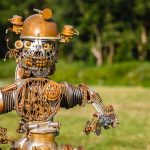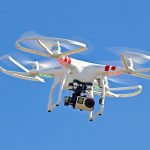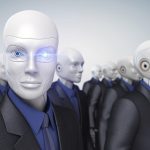According to the OECD, since 1967, the share of men aged 25 to 54 without work has more than tripled, from 5 percent to 16 percent. But the reasons they are not working have less to do with the rise of the machines than we are being led to believe. Not only will machines compete for positions, but global population growth and a rather stunted job market will make competition … [Read more...] about If a Robot is Going to Take My Job, Should it Pay My Taxes?
Robotics
Robotics is becoming prevalent in our lives. It's crucial to understand its implications for the future of work. Discover all you need to know about robotics here.
What do Big Data and Robo Advisors Have in Common?
There are many investors and analysts that are calling 2016 the year of the robo. One can barely get on a computer without being bombarded with ads and content from a sector that is growing faster than it can handle. Even some of the more traditional brokers are starting to offer a more digitalized version of an advisor for a new generation of investors that expect massive … [Read more...] about What do Big Data and Robo Advisors Have in Common?
To Fear or Not to Fear Robots, That’s the Question
For all of us who follow with interest the progress of Artificial Intelligence (AI) and Robots, the recent news about the victory of Googles AlphaGo against grandmaster Lee Se-Dol has made us think if we face the evolutionary moment in which technology finally triumphed humanity and it was Google who just proved how unpredictable artificial intelligence can be. To Fear or Not … [Read more...] about To Fear or Not to Fear Robots, That’s the Question
How Combining Big Data and Drones Can Improve the World
Weve all hear the bad stories about drones, from their uses in violence and war to their use to spy into someones bedroom on the fifth floor. Recently, drones have been receiving a bad reputation for their misuse, compelling many to see them as simply bad. However, these remotely-piloted machines have many uses that can range from pure entertainment to improving the environment … [Read more...] about How Combining Big Data and Drones Can Improve the World
The Rise of Robots and AI, are They Taking Over the World?
Atlas from Boston Dynamics (a subsidiary of Google) is a pretty resilient chap, judging by this video. He can trudge through uneven snow, be knocked off his feet and get up again (in an eerily similar way to the film Real Steel), and perform the sorts of menial tasks that might take place in any warehouse or shop storeroom across the country. In fact, it is hard to believe that … [Read more...] about The Rise of Robots and AI, are They Taking Over the World?
What is robotics?
Robotics refers to the branch of technology that deals with designing and operating robots. Robotics also deals with artificial intelligence — the ability of machines to carry out tasks that would normally require human intelligence, like understanding natural language and recognizing objects. Want to learn more about robotics? Datafloq has courses available. Contact us to get started.
What are robots used for?
Robots are used in industrial and commercial settings for welding, fabricating, testing, measuring, and inspection. In addition, they can work in dangerous or difficult environments that would otherwise be unsafe for human workers.
At home, robots are commonly used as vacuum cleaners, lawnmowers, and window cleaners. Some more advanced home robot models can also perform complex tasks such as making a bed or folding laundry. As technology continues to evolve, the number and variety of tasks robots can perform will likely continue to grow.
What are the different types of robots?
There are many different types of robots, each designed for a specific purpose. Some robots are designed for manufacturing tasks, such as welding or fabricating parts. Others are for logistics tasks, such as moving materials around a warehouse. There are also robots that are designed for domestic chores like vacuuming or mowing the lawn.
Each type of robot has its strengths and weaknesses, and the right type of robot for a given task will vary depending on the job’s specific requirements. When choosing a robot, it is important to carefully consider the capabilities of each type to ensure that the right tool is selected for the job at hand.
What are the advantages of robots?
Robots have many advantages over human workers. They can work faster, with more precision, and are not affected by environmental conditions. They can work 365 days a year without rest and don’t require breaks or vacations. Additionally, they are not affected by emotions or physical needs, so they can maintain peak performance at all times.
Robots can also be programmed to perform specific tasks, which helps minimize mistakes. Finally, the long-term costs involved with robots are more affordable, as there is no need for health insurance or other benefits. In short, robots offer several advantages over human workers, making them an attractive option for many businesses.
What is the future of robotics?
In the near future, robots will likely become increasingly commonplace in commercial and residential settings. One area where robots are already making an impact is the healthcare industry. Robots are being used to assist surgeons, transport patients, and dispense medication.
They are also being developed to provide companionship and care for the elderly and infirm. As robotics technology continues to advance, the scope of what robots can do is likely to expand even further. Ultimately, the future of robotics will likely be defined by the imagination of those who create them.







